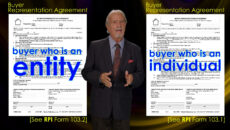Form-of-the-Week: Property Sold Report – Administrative and Fee Information – Form 523
Transaction tracking by a paper trail
At the core of a broker’s supervision of their agents is their duty owed the California Bureau of Real Estate (CalBRE) to be aware of each agent’s activity on real estate transactions, whether on behalf of a buyer, owner, tenant or lender. To achieve compliance, the broker needs to require their employed agents, whether sales agents or associate brokers, to report when:
- a listing is taken;
- an offer is accepted; and
- a sale closes escrow.
However, prudent brokerage practice requires agents and associates to report transaction activity by documentation at each critical stage of the representation of a client. It is the primary evidence of documentation by their agents disclosing their activities which helps the broker fulfill their duty to supervise. It also gives the broker a literal paper trail to refer to in the event something goes wrong (i.e., if an agent is negligent or a client pursues legal action against the broker and one of their agents).
When a sales agent enters into a listing with a client for the services of their broker’s staff, they need to prepare and submit a checklist type of form to the broker’s transaction coordinator (TC). On the form, they note all relevant information about activities undertaken in the employment. This includes information on:
- the type of employment created by the listing [See RPI Form 522 §2];
- the agreed-to brokerage fees [See RPI Form 522 §3];
- the property to be sold [See RPI Form 522 §4];
- how the listing was obtained [See RPI Form 522 §5];
- the client [See RPI Form 522 §6]; and
- office duties required to service the client. [See RPI Form 522 §7]















